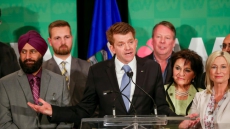OTTAWA — The Islamic State of Iraq and the Levant has declared "war" on Canada, the Harper government is fond of saying.
With Parliament poised to embark on a renewed, expanded combat mission, some analysts are wondering whether Canada has the stomach for what's ahead — whether it's a proxy war or not.
"It's clear, given the limited scope of the military involvement in Iraq and Syria, that the answer is 'No,'" said Steve Saideman, the Paterson Chair in International Affairs at Carleton University in Ottawa.
Everyone has noticed how the government "fudged over the word 'combat'" when it came to the special forces training of Kurdish fighters.
So, then perhaps the better question is whether Canadians are prepared for what the country's erstwhile allies may have to do themselves in order to liberate territory from the grip of extremists.
The strategy of keeping a safe distance — train local forces to do the fighting, keep western 'boots' in the form of conventional army units off the ground, drop bombs from 3,000 metres up — clearly has domestic political appeal.
But Saideman and retired colonel George Petrolekas wonder what will happen if and when Kurdish fighters, Iraqi forces and the Shiite militias are forced to break the will of extremists in places like Mosul, which has been under the boot of the Islamic State since last summer.
In order to avoid a bloodbath for the assaulting forces, the military campaign may require that Iraq's second-largest city — more than 660,000 people — face a total siege and be starved into submission.
That's what "war" means, they say.
"People are going to die, and the whole purpose of it is to make it as short as possible," said Petrolekas, of the Conference of Defence Associations. A safe, distant strategy will mean a long campaign, he added.
"In Iraq, you have a government that's arming Shiite militias, working with Iranians on the ground, and they are just brutal," Saideman said.
"The questions are more stark in Syria about whether bombing ISIL is going to help (President Bashar) al-Assad, who has killed more people."
The challenge for the government going forward will be to convince the public at home "that we're helping in these specific ways and the rest is not our fault," said Saideman.
"That is a very difficult balancing act."
The recent battle for Tikrit, in northern Iraq, has proceeded in fits and starts because Iraqi forces and Iranian-trained Shiite militias, such as Hashid al-Shaabi and the Al Bataar Brigade, have suffered high casualties without air support.
The reality of local forces carrying the fight is often messy, slow and potentially treacherous, especially from a human rights perspective. That's even before sectarian-score settling between Shiite and Sunni factions.
Tikrit is just a warm-up for Mosul.
Foreign Affairs Minister Rob Nicholson has said freeing the region from the tyranny of ISIL is an exercise in "moral clarity" — an easy argument to make, given extremist atrocities and the obvious delight they take in perpetrating them.
But Saideman wondered how much "clarity" there will be when the first TV images of apartment buildings being reduced to rubble are splashed across western television screens. The northern Syrian city of Kobani, he said, already "looks like Stalingrad."
"I don't think we've got the stomach for that," Saideman said.
"And then there's the other side, when you say our local allies are hardly reliable to be discriminate in the use of force."
When the U.S. tried street-to-street fighting in the first battle of Fallujah, the Bush administration ordered a halt to the assault because it was so bloody, he added.
In Afghanistan, both Canada and the U.S. wondered about the quality and reliability of local forces. The questions there were more benign, revolving around power — or whether they were stealing money.
Those days, Saideman warned, are going to look rather quaint compared to what may be ahead.



